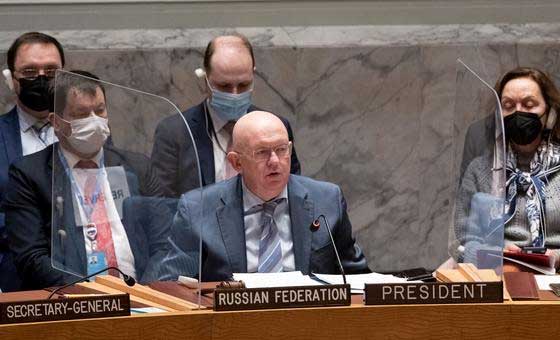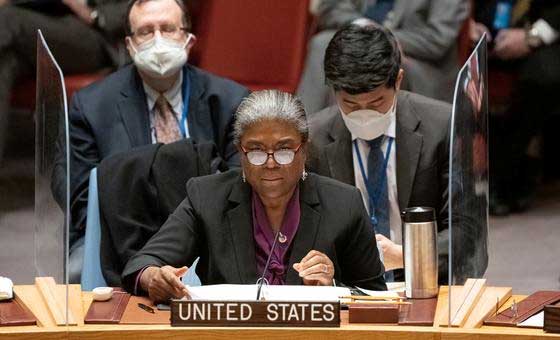A Move to Undermine the Anachronistic Veto Powers in the Security Council Gains Traction

UNITED NATIONS, Apr 22 (IPS) - The five permanent members (P5) of the UN Security Council (UNSC) – UK, US, France, China and Russia – have exercised their veto powers primarily to protect their own national interests or the interests of their close political and military allies.
But a proposed new resolution before the General Assembly (GA)-- entitled “Standing mandate for a General Assembly debate when a veto is cast in the Security Council”—is an attempt to undermine the veto in a move likely to be supported by a majority of the 193 member states.
As of last week, the resolution had 57 co-sponsors—and counting.
US Ambassador Linda Thomas-Greenfield told reporters the United States was one of the co-sponsors of the resolution, spearheaded by a core group of Member States led by Liechtenstein.
“This innovative measure would automatically convene a meeting of the General Assembly after a veto has been cast in the Security Council,” she said.
As negotiated in 1945, she pointed out, the UN Charter entrusts in the five Permanent Members of the Security Council the ability to prevent the adoption of a resolution through a veto – a mechanism long the subject of institutional debate.
“The United States takes seriously its privilege of veto power; it is a sober and solemn responsibility that must be respected by those Permanent Members to whom it has been entrusted,” she declared.

When a Permanent Member casts a veto, that member should be prepared to explain why the resolution at issue would not have furthered the maintenance of international peace and security, said Ambassador Thomas-Greenfield.
“Unfortunately, not all members of the Security Council share this sentiment. We are particularly concerned by Russia’s shameful pattern of abusing its veto privilege over the past two decades, including its vetoes to kill a UN observer mission in Georgia, block accountability measures and chemical weapons investigations in Syria, prevent the establishment of a criminal tribunal on the downing of flight MH-17 over Ukraine, and protect President Putin from condemnation over his unprovoked and unjust war of choice against Ukraine.”
The General Assembly resolution on the veto, she declared, will be a significant step toward the accountability, transparency, and responsibility of all of the Permanent Members of the Security Council members who wield its power. https://research.un.org/en/docs/sc/quick
Stephen Zunes, Professor of Politics and International Studies at the University of San Francisco, who has written extensively on the politics of the Security Council, told IPS the General Assembly Resolution 377, adopted back in 1950, gives the GA the authority to make recommendations for collective action in the event that the Security Council fails to act as required to maintain international security and peace.
He pointed out that the General Assembly has invoked this resolution on four occasions when a widely supported resolution was blocked by a veto: in 1950, in regard to the Korean War; in 1981, regarding Namibia; and in 1980 and 1997, involving resolutions concerning Palestine.
“There is some irony in the United States pushing for a more active role for the General Assembly, given that three of those four cases were in response to a U.S. veto. Indeed, over the past fifty years, Washington has been responsible for far more vetoes than any other Security Council member”.
Of the 72 U.S. vetoes of Security Council resolutions, the United States was the sole negative vote in 63 of them, he said.
Asked about a proposal from an Asian country, back in the late 1970s, calling for a double-veto as more effective, instead of a single veto, Zunes said it “certainly has merit”. “But since it would require amending the UN Charter, it is not only likely that Russia would block it, but probably the United States as well”.
The proposed resolution “decides,” among other things, “that the President of the General Assembly shall convene a formal meeting of the Assembly within ten working days of the casting of a veto by one or more permanent members of the Security Council, to hold a debate on the situation as to which the veto was cast, provided that the General Assembly does not meet in an Emergency Special Session on the same situation.”
James Paul, who authored “Of Foxes and Chickens: Oligarchy and Global Power in the UN Security Council,” told IPS that ever since the founding of the UN in 1945, the great majority of UN member states have insisted that vetoes in the Security Council hobble action to preserve the peace. Experts have often pointed out that the veto keeps many important matters outside of Council action entirely.
“Though the five veto-wielding Permanent Members have never agreed to an alteration of their veto powers, smaller countries in the UN General Assembly have sought to weaken the veto, through procedures and actions that delegitimize veto-use and protest against veto-protected aggression and other breaches of the peace by the most powerful governments,” he argued.
A group of like-minded countries, keen on strengthening international peace and legality (and protecting themselves from larger aggressors), has launched the current initiative, building on opposition to the Russian veto of a Council resolution condemning its invasion of Ukraine.
This initiative, he said, would automatically trigger a General Assembly debate anytime the veto is used in the Security Council. In theory, an Assembly debate (even though non-binding) might be a disincentive to veto-use by a Permanent Member. Even if the embarrassment of a debate would not always act as a brake on the arrogance of powerful states, it would be worth implementing
Andreas Bummel, executive director of the Berlin-based Democracy Without Borders, told IPS: “We strongly support Liechtenstein's initiative that the General Assembly is to meet automatically each time a veto is cast in the Security Council.
This, he said, will force the permanent members of the council to justify their vote to the world community. The political cost of misusing the veto will be raised.
Further the General Assembly routinely will be able to consider its own measures. It's an important step in the right direction, said Bummel.
“It is highly welcome and noteworthy that the United States is one of the co-sponsors of the proposed resolution. Obviously, they are prepared to explain any future use of the veto in front of the General Assembly and accept its subsidiary responsibility”.
In a next step, he argued, there should be an understanding that permanent members can cast no votes that are not treated as vetoes against resolutions that otherwise have a majority to pass.
“The UN's whole setup needs to be reviewed though. Everybody knows that it's anachronistic. Eventually, the permanent members need to be prepared to let go of their veto privilege altogether”.
In an interview with IPS, Paul warned: “We have to remember that Permanent Members have many cards to play. The United States, by far the most powerful actor on the world stage, has tremendous influence over a majority of Council members. It often can block or greatly alter Council action without having to cast a veto”.
That is why its invasion and occupation of Iraq in 2003, though initially rejected by the Council, was eventually tolerated by the same Council for many years. In the case of repeated US vetoes of Council resolutions on Israel, the US has never paid a heavy political price.
He said many observers point out that great powers like Russia and the United States constantly act in contempt of multilateralism and with scant regard for the UN and international law.
“So. we can well ask how the United Nations can succeed in a world exposed to such cynical use of violence and raw national aggrandizement. There is certainly no easy answer, but it is clear that those who seek to undermine the veto and expand the potential of international law are on the right course”.
“One day, we can hope, we will prevail,” he said..
Meanwhile, a proposal to reform the Security Council has dragged on for more than two decades, with four strong contenders for permanent seats, namely Germany, India, Japan and Brazil.
But if they do eventually succeed in their attempts, they have to put up with what is best described as “second-class citizenship”, because the P5 have given no indications that any new comers to their ranks will be offered veto powers.
Still, African leaders have long insisted they will not accept any permanent memberships in the UNSC, without veto powers.
IPS UN Bureau Report
Follow @IPSNewsUNBureau
Follow IPS News UN Bureau on Instagram
© Inter Press Service (2022) — All Rights ReservedOriginal source: Inter Press Service
 Global Issues
Global Issues